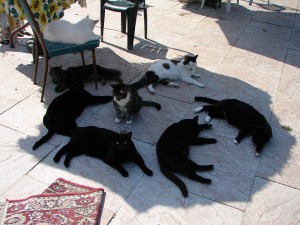strategy, strategics ![]()
[noun]
[de stra-te-gie, de stra-te-gie-ën]
"Strategie" is pretty much used the same way as in English; when it regards the military you can emphasize that by saying 'militaire strategie'. Note the diaeresis ("trema") in the plural form of 'strategie'. As the stress is on the last syllable you have to add an 'e', as opposed to sticking the diaeresis on the already present 'e'.
When coming up with this word I had to think of the board game 'Stratego', read more in the Extra below.
Examples:
– "Ok jongen, wat is de strategie, laden we eerst de grote dingen in of eerst de kleine?"
("Ok man, what is the strategy, do we load the big things first, or the small things?" Note that in the example the noun is not repeated after 'kleine'; you can do this in case you have already mentioned the noun before.)
– "Eerst de grote! Het is wiskundig bewezen dat dat de beste strategie is."
("First the big things! It is mathematically proven that that is the best strategy.")
– "Wat is het doel wat je wil bereiken? Je moet eerst een doel hebben voordat je de strategie kunt gaan bepalen!"
("What is the goal that you want to achieve? You need to have a goal first before you can start determining the strategy!")
– "Het is allemaal leuk en aardig zo'n 'managementstrategie', maar volgens mij heeft de directie niet eens een visie!"
("It's all well and good, a 'management strategy', but I think the board (of directors) does not even have a vision!")
– "Ik geef toe dat onze strategie niet tot de gewenste resultaten heeft geleid. Derhalve dien ik mijn ontslag in."
("I admit that our strategy has not led to the desired results. Therefore I resign." Another way to say 'derhalve' is 'om die reden' ('for that reason').)
– "Waarom moet jij voor alles altijd een strategie hebben?"
("Why do you always want to have a strategy for everything?")
Expressions:
– "Een plan uitstippelen": to outline a plan.
Related words:
– Tactiek: tactics [noun] [de taktiek, de taktieken].
– Strategisch: strategic [adjective].
– Plan: plan [noun] [het plan, de plannen].
Example:
– "Ik vind het geweldig als een plan klopt!"
("I love it when a plan comes together!" I admit this is a bit of a 'forced' example but you don't always get the chance to quote Hannibal 😉 )
– Slagen: to succeed [verb] [slaagde, geslaagd].
– Falen: to fail [verb] [faalde, gefaald].
Extra:
'Stratego' is an, originally Dutch, old-school 'capture-the-flag' board game. I don't remember much of the game other than being jealous of school friends who had it 🙂 Looking at the wikipedia page it is still going strong with annual international tournaments!

 The verb “harden” translates as “to harden”, “to toughen up” or “to bear/stand”. In case of the latter, one often uses the phrase “niet te harden” to say that something is unbearable. This can basically be anything, see the examples.
The verb “harden” translates as “to harden”, “to toughen up” or “to bear/stand”. In case of the latter, one often uses the phrase “niet te harden” to say that something is unbearable. This can basically be anything, see the examples.